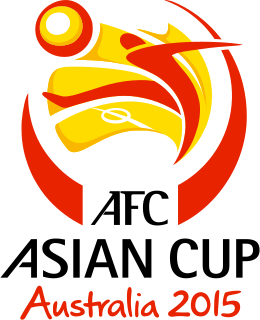
The Iraq national football team represents Iraq in international football and is controlled by the Iraq Football Association (IFA), the governing body for football in Iraq. Iraq's usual home venue is the Basra International Stadium.

The North Korea national football team represents North Korea in men's international football and it is controlled by the DPR Korea Football Association, the governing body for Football in North Korea. The team represents both FIFA and Asian Football Confederation (AFC).

The United Arab Emirates national football team represents United Arab Emirates in international association football and serves under the auspices of the country's Football Association.

The Bahrain national football team represents Bahrain in international football and is controlled by the Bahrain Football Association, which was founded in 1951 and joined FIFA in 1966. They have never reached the World Cup, but have twice come within one match of doing so. Bahrain won the FIFA's most improved team award in 2004, and finished fourth in the 2004 Asian Cup, beating Uzbekistan in the quarter-finals but losing to Japan in the semi-finals 4–3. Bahrain then lost to Iran in the third-place match, thus finishing in fourth place overall. Bahrain had a golden year in 2019, winning both the WAFF Championship and the Arabian Gulf Cup for the first time, under the stewardship of Hélio Sousa.

The Qatar national football team represents Qatar in international football, and is controlled by the Qatar Football Association and AFC.

The Syria national football team represents Syria in association football and is controlled by the Syrian Arab Federation for Football, the governing body for football in Syria. Syria has never qualified for the World Cup finals but did reach the fourth qualification round in 2018. The team is currently banned by FIFA from playing at home, as they have not hosted a game since December 2010.

The Australia men's national soccer team represents Australia in international men's soccer. Officially nicknamed the Socceroos, the team is controlled by the governing body for soccer in Australia, Football Australia, which is affiliated with the Asian Football Confederation (AFC) and the regional ASEAN Football Federation (AFF).

The 2015 AFC Asian Cup was the 16th edition of the men's AFC Asian Cup, a quadrennial international football tournament organised by the Asian Football Confederation (AFC). It was held in Australia from 9 to 31 January 2015. The tournament was won by Australia after defeating South Korea 2–1 in extra time in the final, thereby earning the right to participate in the 2017 FIFA Confederations Cup, which was hosted by Russia. The win was Australia's first Asian title since their move from the Oceania Football Confederation (OFC) in 2006. It was also the first time a men's team has become champions of two confederations, following Australia's four OFC Nations Cup titles: 1980, 1996, 2000 and 2004; right after the Australian women's team won the 2010 AFC Women's Asian Cup.
The India national under-23 football team represents India in international under-23 football and is controlled by the All India Football Federation (AIFF). A member of the Asian Football Confederation (AFC), the team is eligible to compete in the Summer Olympic Games, the AFC U-23 Asian Cup, and the Asian Games, subject to qualification.

The 2019 AFC Asian Cup was the 17th edition of the AFC Asian Cup, the quadrennial international men's football championship of Asia organised by the Asian Football Confederation (AFC). It was held in the United Arab Emirates from 5 January to 1 February 2019.
The 2022 FIFA World Cup qualification is the qualifying process which decided the 31 teams that will join hosts Qatar, who received an automatic spot, at the 2022 FIFA World Cup.
The 2019 AFC Asian Cup qualification was the qualification process organized by the Asian Football Confederation (AFC) to determine the participating teams for the 2019 AFC Asian Cup, the 17th edition of the international men's football championship of Asia. For the first time, the Asian Cup final tournament was contested by 24 teams, having been expanded from the 16-team format that was used from 2004 to 2015.
The Asian section of the 2018 FIFA World Cup qualification acted as qualifiers for the 2018 FIFA World Cup, held in Russia, for national teams which were members of the Asian Football Confederation (AFC). 4.5 slots in the final tournament were available for AFC teams.

The 2019 AFC Asian Cup Final was a football match which determined the winner of the 2019 AFC Asian Cup, the 17th edition of the AFC Asian Cup, a quadrennial tournament contested by the men's national teams of the member associations of the Asian Football Confederation. The match was held at the Zayed Sports City Stadium in Abu Dhabi, United Arab Emirates, on 1 February 2019 and was contested by Japan and Qatar.
This page summarises the Australia men's national soccer team fixtures and results in 2019.

The Asian section of the 2022 FIFA World Cup qualification acted as qualifiers for the 2022 FIFA World Cup to be held in Qatar for national teams who are members of the Asian Football Confederation (AFC). Apart from Qatar, a total of 4.5 slots in the final tournament were available for AFC teams.
The 2021 AFC Champions League was the 40th edition of Asia's premier club football tournament organized by the Asian Football Confederation (AFC), and the 19th under the current AFC Champions League title.
The third round of AFC matches for the 2022 FIFA World Cup qualification was played from 2 September 2021 to 29 March 2022.










